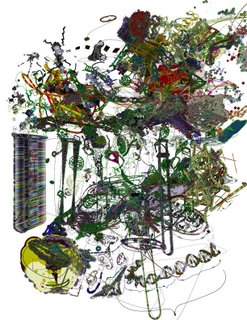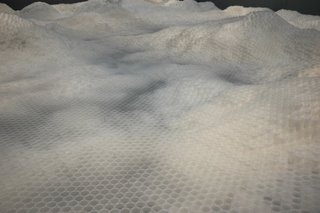28 September 2006
20 September 2006
Americans and the Power of Magical Thinking

GW Bush: "We are addicted to foreign oil."
Brazil: "Hey that's okay... we have some sugar-cane ethanol you could buy instead. It's cheaper, it's a scalable resource. Good for greenhouse gas emissions, and we could stop logging the Amazon rainforest if you bought it. How win-win is that?"
Bush: "No thanks. We'd rather subsidize anti-American activity in the middle east by sticking with the foreign oil plan. Surely you'll understand the huge tariff we are going to place on your ethanol....We are Evil!!! MOUAAHAHAHAHAHAHAHAHAHA!!!!!"
Or is it like this:
GW Bush: "We are addicted to foreign oil."
Brazil: "Hey that's okay... we have some sugar-cane ethanol you could buy instead. It's cheaper, it's a scalable resource. Good for greenhouse gas emissions, and we could stop logging the Amazon rainforest if you bought it. How win-win is that?"
Bush: "Ummmmm..... No thanks, little man. We have so much going on in the middle east already and the only way we can imagine all this bloodshed being worthwhile is to make sure oil remains the most important commodity ever. So surely you'll understand the huge tariff we are going to place on your ethanol."
Surely it can't be:
Bush: "We are addicted to foreign oil."
Brazil: "Hey that's okay... we have some sugar-cane ethanol you could buy instead. It's cheaper, it's a scalable resource. Good for greenhouse gas emissions, and we could stop logging the Amazon rainforest if you bought it. How win-win is that?"
Bush: "Scalable? Greenhouse? Where in Deuteronomy is this "greenhouse" business? Who are these people?"
Undersecretary of Revalation: "Greenhouse... greenhouse. That's a Book of Revalation issue, sir."
Bush Administration: "Ah, yes... greenhouse! Will this Brazilian plan hasten or prolong our deliverance from this vale of tears?"
Undersecretary of Revalation: "Prolong, sir."
Bush: "We'll slap a huge tariff on that."
Feel free to play along... the variations are endless.
19 September 2006
Soaking In It
I was just listening to this. Just in case you don't have time to listen to the segment, here is the synopsis, courtesy WNYC:
Our Chemical "Body Burden"
The average American carries a “body burden” of hundreds of synthetic chemicals—like Teflon and pesticides. In The Hundred-Year Lie, investigative journalist Randall Fitzgerald says everyday chemical exposures are ruining our health…and making humans the most polluted species on Earth.
Randall Fitzgerald is basically saying that DDT, formaldehyde, birth control pills, etc. etc. is coursing through our veins--every single one of us--and if you buy into the detox hype, you can manage to get like two-thirds out regularly.
And maybe this is too easy for me to say, as a healthy person who, knock wood, seems to be co-existing peacefully with my toxicity, but this detox prescription seems wrong-headed.
I have no reason not to believe this guy. I have seen how strangely plastics behave, I have read enough MSDS to know that everything hurts you, I know that my body is permeable. And if I had Parkinson's or Crohn's disease I would probably be singing a different tune...
...But resistance is futile! The very concept of pollution is based on the idea that there is something pure to besmirch. The body is not pure, is not just flesh. It pokes out into space and space pokes back into it, and there is contamination both ways. Just as my thoughts and actions affect the world, the things in the world affect me.
To attempt to detoxify oneself is to attempt to preserve a boundary that is false.
This is not to say that pollution is OK. Far from it. Because there is no boundary between ourselves and our environment, we need to stop putting things out there that we won't eventually want to eat.
What I am saying is that any movement forward depends on completely believing in this interdependent state. Not working to detoxify myself, because that strategy is based on anxiety and personal gain and this fallacy that I can be separate from the world. But total acceptance of my permeability can lead to change. Total acceptance of the toxicity of the food I eat and the water I drink.
And that feels weird to say, but how else is forward movement possible?
Our Chemical "Body Burden"
The average American carries a “body burden” of hundreds of synthetic chemicals—like Teflon and pesticides. In The Hundred-Year Lie, investigative journalist Randall Fitzgerald says everyday chemical exposures are ruining our health…and making humans the most polluted species on Earth.
Randall Fitzgerald is basically saying that DDT, formaldehyde, birth control pills, etc. etc. is coursing through our veins--every single one of us--and if you buy into the detox hype, you can manage to get like two-thirds out regularly.
And maybe this is too easy for me to say, as a healthy person who, knock wood, seems to be co-existing peacefully with my toxicity, but this detox prescription seems wrong-headed.
I have no reason not to believe this guy. I have seen how strangely plastics behave, I have read enough MSDS to know that everything hurts you, I know that my body is permeable. And if I had Parkinson's or Crohn's disease I would probably be singing a different tune...
...But resistance is futile! The very concept of pollution is based on the idea that there is something pure to besmirch. The body is not pure, is not just flesh. It pokes out into space and space pokes back into it, and there is contamination both ways. Just as my thoughts and actions affect the world, the things in the world affect me.
To attempt to detoxify oneself is to attempt to preserve a boundary that is false.
This is not to say that pollution is OK. Far from it. Because there is no boundary between ourselves and our environment, we need to stop putting things out there that we won't eventually want to eat.
What I am saying is that any movement forward depends on completely believing in this interdependent state. Not working to detoxify myself, because that strategy is based on anxiety and personal gain and this fallacy that I can be separate from the world. But total acceptance of my permeability can lead to change. Total acceptance of the toxicity of the food I eat and the water I drink.
And that feels weird to say, but how else is forward movement possible?
18 September 2006
Classic LeisureArts
Beautiful stitching of Baudrillard to Kaprow over on Leisurearts.
Of course, my take on this skewering of the "as art" impulse is that there is value in the word "art." It separates the digestion, re-examination and re-framing of the experience for others from the experience itself, which is necessarily immediate and private. It is entirely possible to bounce up and down gleefully as dilletante ventures puts a nice fine point on the destructive power of the "as art" impulse:
it becomes a way of subjugating the world to a particular critical regime and seeks to infiltrate the self-perception of others, so that they see themselves and their activities through the "as art" lens.
And still want art, as a category that is separate from life. Alan Kaprow was a fucking god and everything (not being facetious here!), but there is something very selfish about making life and art the same thing. Hold on a minute... I need to go find my copy of that Robert Irwin book.
Okay. In Seeing Is Forgetting The Name Of The Thing One Sees, Robert Irwin has this to say about art:
The object of art may be to seek the elimination of the necessity of it.
The works of previous artists have come from their own experience or insights, but haven't given the experience itself. They set themselves up as a sort of interpreter for the layman... Our interest is in a form where you realize that the media are just perception.
The experience of the "thing," experiencing is the "object."
Pretty sympathetic to the Leisurearts Party Line, no?
But James Turrell worked closely with Irwin and came away disappointed:
Sometimes I feel like I've found some things out, but they don't apply to anyone else unless they come to them in the same way.
This is what I am getting at. Art, as a category or discipline, does valuable work. It stands outside the experience, so that the experience can be shared. And this is not a matter of "interpreting for the layman," but of actually being able to permeate the boundaries between your flesh and mine without, you know... doing it. Turrell is not a populist. He's an intimist. His goal is to actually share, not to reduce.
Edited to clarify: There was a statement here saying that while I loved this skewering of the "as art" gaze, Leisurearts and I are working toward opposite ends. This is not true. DV and I actually seem to be working toward very similar goals in ways that I do not understand yet, using different tools. I want to understand this better.
Of course, my take on this skewering of the "as art" impulse is that there is value in the word "art." It separates the digestion, re-examination and re-framing of the experience for others from the experience itself, which is necessarily immediate and private. It is entirely possible to bounce up and down gleefully as dilletante ventures puts a nice fine point on the destructive power of the "as art" impulse:
it becomes a way of subjugating the world to a particular critical regime and seeks to infiltrate the self-perception of others, so that they see themselves and their activities through the "as art" lens.
And still want art, as a category that is separate from life. Alan Kaprow was a fucking god and everything (not being facetious here!), but there is something very selfish about making life and art the same thing. Hold on a minute... I need to go find my copy of that Robert Irwin book.
Okay. In Seeing Is Forgetting The Name Of The Thing One Sees, Robert Irwin has this to say about art:
The object of art may be to seek the elimination of the necessity of it.
The works of previous artists have come from their own experience or insights, but haven't given the experience itself. They set themselves up as a sort of interpreter for the layman... Our interest is in a form where you realize that the media are just perception.
The experience of the "thing," experiencing is the "object."
Pretty sympathetic to the Leisurearts Party Line, no?
But James Turrell worked closely with Irwin and came away disappointed:
Sometimes I feel like I've found some things out, but they don't apply to anyone else unless they come to them in the same way.
This is what I am getting at. Art, as a category or discipline, does valuable work. It stands outside the experience, so that the experience can be shared. And this is not a matter of "interpreting for the layman," but of actually being able to permeate the boundaries between your flesh and mine without, you know... doing it. Turrell is not a populist. He's an intimist. His goal is to actually share, not to reduce.
Edited to clarify: There was a statement here saying that while I loved this skewering of the "as art" gaze, Leisurearts and I are working toward opposite ends. This is not true. DV and I actually seem to be working toward very similar goals in ways that I do not understand yet, using different tools. I want to understand this better.
14 September 2006
Worldchanging
There will be time to thoroughly digest this later. For now, my glass is raised to Jerry Saltz, despite the clunky simile comparing art to domestic animals. The relationship between art and action may not be catlike, but Saltz is otherwise on the money--it is not straightforward.
12 September 2006
Infinite Little Somethings

Malevich.
Ingrid Schaffner's essay, Doing Nothing, is a little hard to link to, but kind of worth the hunt. Click here, then find pages 34-40 and be sure to click on the little icon that makes the text appear at a readable size.
She is writing about her group exhibit, The Big Nothing, at the ICA in 2004, which framed modernism in terms of leisure and "doing nothing". This makes art into a reductive quest for essence. Schaffner's essay is interesting because it puts current practice into historical perspective. Contemporary art continues in the Gertrude Stein vein, focusing on leisure and nothingness, I think for the same reductive reasons. But the structure of this relationship--the individual's relationship to the world and truth--has utterly changed. No wonder art is suffering from a relevancy problem!

McQuilkin.
I don't know about you, but I look out on a world that denies essence-finding, that is not about Truth, that is not about doing nothing at all anymore--doing nothing has become a manner and a trap. Doing nothing is what the credit card companies expect you to do when they raise your interest rate to 30% for no good reason, and what the cellphone company expects you to do when they seem to bury an incorrect $15 charge inside the thicket of your bill every single month. Doing nothing is SUVs and corn syrup and not understanding what the WTO even is. And doing nothing doesn't even really exist! People work too much, take work emails at home and spend way too much time on little portable devices that require you to divide your attention. A small number of powerful people are depending upon the powerlessness of doing nothing, not so that they can directly enslave you, but so that you can enslave yourself using their products: "exotic mortgage", useless health insurance paired with get-tough bankrupcy law, exurban lifestyle.
That ambiguity--the surreal quality of America today--is all about the inappropriateness and fakeness of our leisure. What can we do to save America from terrorists? Go shopping! All the blackberry ads promised that this thing came with a hammock and a beach!
What is one powerless individual to do in the face of this madness? Do something. Something that admits your powerlessness, the fact that the world is nodal--not monolithic.

Shane Hope.
There is no big thing to uncover, no one Truth to relate to. The fact is that power is in a million little do-nothing bargains that are designed to please you as they enslave you. It's Brave New World, not 1984, and nobody is centrally organizing the new corporate feudalism--there is no Them. Freedom and truth, as well as their absences, are transactional in this landscape.
There is power in this confusion, but the power is not about ego and direct relationships with the big anything.
11 September 2006
MakerThinker: Ambiguity

I don't know about you, but I am still turning around the barge of defeatism that showed up this summer.
That's the problem with thinking. Any thinking person's response to the world we are living in today is fuck it, because the world we live in is totally ambiguous and irrational, and this is getting worse not better. To think about the state of things is to list problems and see the hugeness of those problems and see that there is no solving for the Middle East, say. There is no global warming solution.
(well, there are very easy solutions for climate change, but they aren't happening)
To think is to attempt to resolve ambiguity. The reason Berman and Larsen's arguments are comforting but hollow is because they attempt to address the cause of the ambiguity, and yet the ambiguity persists. This is not foolish on their part--it is rational to look at the world and figure out what is wrong with it and write about that problem. But what's the point in this exercise when the world doesn't work like that anymore and probably never did?
Any Makerthinker will tell you that there is a huge distance between the idea in your head and the thing or event that manifests the idea, and that zone between the idea and its manifestation is nothing if it is not ambiguous.
And I find in my own work that the longer I can stay inside this ambiguous zone without finding the rational solution the better. Tara Donovan can be really good at this. I did not watch Tara Donovan make the piece above, but I imagine this as the result of doing a lot of different things with paper plates. Or worse, of having this perfect idea of what paper plates would do and negotiating, negotiating, negotiating to get what paper plates really do. This is an uncomfortable process because it is not straightforward. Rather, Donovan seems to be depending on that ambiguous zone. What is the plate unit? What is its cellular structure? What are the structural limitations? What kinds of shapes can this logic or structure of plates make?
Who the hell knows the answers to these questions until you are knee-deep in plates?
This piece is interesting because it incubates in that ambiguous zone until it finds its own freaky logic. Donovan does not always allow herself to do this:

Yeah, I've accepted the rational assertion of a material, process or idea like this. And that straightfowardness, that working to resolve ambiguity, is never quite as interesting.
There are people who work to resolve ambiguity with extreme force and grace (Serra). And there are people who have it backwards and deliver the ambiguity as product (Charles Ray). And these are great ways of working, but I am interested in the hopeful mess. I am interested right now in how deeply relevant the Makerthinker's relationship to ambiguity is right now. I am interested in artistic dialogues that prolong and nurture ambiguity, and do not fight to resolve it.



